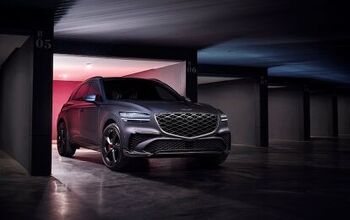Buttigieg Issues Rebuttal to Elon Musk Regarding EV Subsidies

U.S. Transportation Secretary Pete Buttigieg has responded to criticisms Elon Musk has made about the Biden administration’s plan for electric vehicle subsidies.
The Tesla CEO believes the Obama-era EV tax credits were more than sufficient, with his own company serving as physical proof, and suggested the entire Build Back Better Act be tossed into the toilet. But Secretary Buttigieg said it was a necessary item if the United States hoped to advance electrification, swiftly transition away from combustion vehicles, and escape the perils of climate change (formerly known as global warming).
While Tesla would indeed be eligible for the reinstated $7,500 EV tax credit scheme, which would no longer include a vehicle cap for manufacturers, Musk said the plan had already had its day.
“Going back to the infrastructure bill, there’s this idea that Tesla always gets subsidies, but it’s important to note that the vehicle purchase tax credit that $7,500, Tesla stop getting that like 2 years ago,” Musk explained during The Wall Street Journal’s CEO conference held on Tuesday. “Everyone else, except for GM, still get the federal tax credit. So all of our sales from this year and last year had nothing to do with the tax credit because we were no longer eligible because we made so many electric cars. Tesla has made roughly two-thirds of all the electric cars in the United States. I am not sure if most people are aware of that. We don’t need the $7,500 tax credit. I would say … can the whole bill. Don’t pass it, that’s my recommendation.”
However, the bill isn’t limited to rebooting President Obama’s EV tax credit plan. The proposed Build Back Better legislation is ridiculously long and staggeringly broad, setting aside funding for all sorts of government initiatives. Several of those are tied directly to the energy and automotive sectors, with a provision to set aside $7.5 billion for electric vehicle charging that appears to serve both.
Tesla already has a sizable proprietary charging network and has begun opening up to the general public. It obviously isn’t interested in any government-funded competition, with its CEO suggesting it’s totally unnecessary to fund EV charging when gas stations don’t receive help. But the elephant in the room is how the Biden administration opted to give preferential treatment to unionized production. American automakers that source their workforce from union labor would eligible for another $4,500 in incentives per car (for a possible EV tax credit of $12,500). However, Tesla’s aversion to collective bargaining keeps that option off the table.
“Of course we believe in the benefits of union jobs,” Buttigieg told The Wall Street Journal as part of his rebuttal. “These are things that don’t happen on their own.”
The transportation secretary suggested that tying funding to unions was one way to ensure that the president’s climate goals would be conducted in a matter that is equitable and benefits U.S. workers.
“We think it’s very important to fund EV charging stations and to also make sure what’s in the next Build Back Better Act to buy down the price of electric vehicles,” Buttigieg said. “And let me explain why. Look, the market is going electric already. That’s going to happen. The automotive sector is already headed that way and where not here to cause that technological adoption to happen.”
“We’re here because there are three things that will not happen happen on their own: One, for it to happen quickly enough to meet our climate challenges. Two, for it to happen in equitable terms that will actually reach the Americans who stand — theoretically — to benefit the most from EVs. Low income, urban Americans … rural drivers. But they only capture those benefits if they can afford to buy and EV in the first place. And third, the importance of making sure that this electric vehicle revolution is made in America and creating good paying jobs.”
Buttigieg suggested that, by tacking on a $12,500 tax credit to a hypothetical $40,000 “good quality electric truck,” the government would effectively make it possible for millions of Americans to get in on the “electric revolution” that would not have otherwise been able. Customers wouldn’t longer need to wait for economies of scale to gradually lower the price of EVs over the next decade and rural drivers could begin enjoying fuel savings transitioning away from gasoline or diesel-powered cars immediately, he added.
“We think this is incredibly important and it’s certainly a very, very important part of meeting our climate commitments and climate responsibilities as a country.”
[Image: Michael F. Hiatt/Shutterstock]

A staunch consumer advocate tracking industry trends and regulation. Before joining TTAC, Matt spent a decade working for marketing and research firms based in NYC. Clients included several of the world’s largest automakers, global tire brands, and aftermarket part suppliers. Dissatisfied with the corporate world and resentful of having to wear suits everyday, he pivoted to writing about cars. Since then, that man has become an ardent supporter of the right-to-repair movement, been interviewed on the auto industry by national radio broadcasts, driven more rental cars than anyone ever should, participated in amateur rallying events, and received the requisite minimum training as sanctioned by the SCCA. Handy with a wrench, Matt grew up surrounded by Detroit auto workers and managed to get a pizza delivery job before he was legally eligible. He later found himself driving box trucks through Manhattan, guaranteeing future sympathy for actual truckers. He continues to conduct research pertaining to the automotive sector as an independent contractor and has since moved back to his native Michigan, closer to where the cars are born. A contrarian, Matt claims to prefer understeer — stating that front and all-wheel drive vehicles cater best to his driving style.
More by Matt Posky
Latest Car Reviews
Read moreLatest Product Reviews
Read moreRecent Comments
- Lou_BC Let me see. Humans are fallible. They can be very greedy. Politicians sell to the highest bidder. What could go wrong?
- SPPPP Vibrant color 9 times out of 10 for me. There may be a few shapes that look just right in metallic gray, for example. There are a few nices ones out there. And I like VW "White Silver". But I'd usually prefer a deep red or a vibrant metallic green. Or a bright blue.
- 28-Cars-Later Say it ain't so, so reboot #6* isn't going to change anything?[list=1][*]V4-6-8 and High "Tech" 4100.[/*][*]Front wheel drive sooooo modern.[/*][*]NOrthSTARt.[/*][*]Catera wooooo.[/*][*]ATS all the things.[/*][*]We're *are* your daddy's Tesla. [/*][/list=1]
- MaintenanceCosts Can I have the hybrid powertrains and packaging of the RAV4 Hybrid or Prime with the interior materials, design, and build quality of the Mazda?
- ToolGuy I have 2 podcasts to listen to before commenting, stop rushing my homework.


































Comments
Join the conversation
Must be the redesigned Toro with the new 1.3 turbo 170hp engine. Strada would be laughable small for the NA market.
"escape the perils of climate change (formerly known as global warming)." Its name should be changed to a symbol and be referred to as the "unprovable hoax formerly known as global warming".